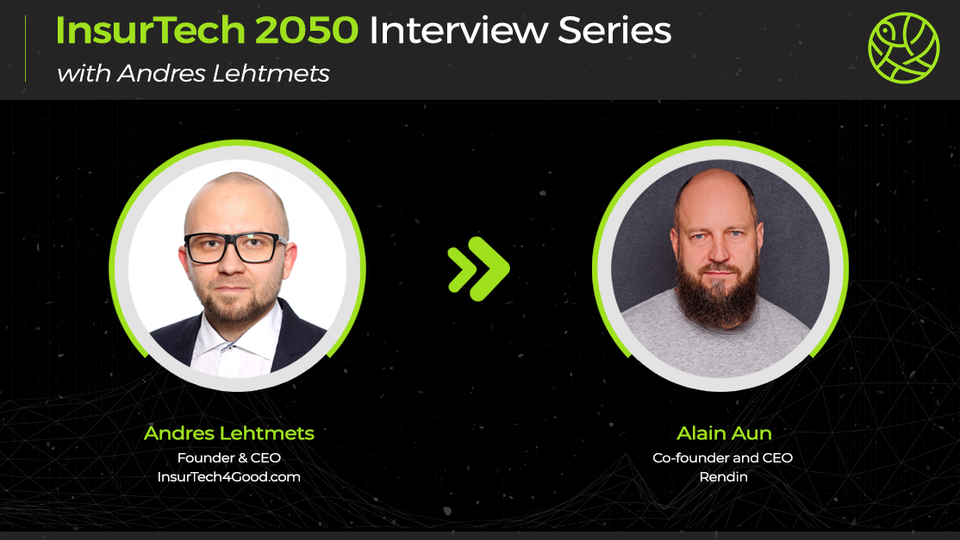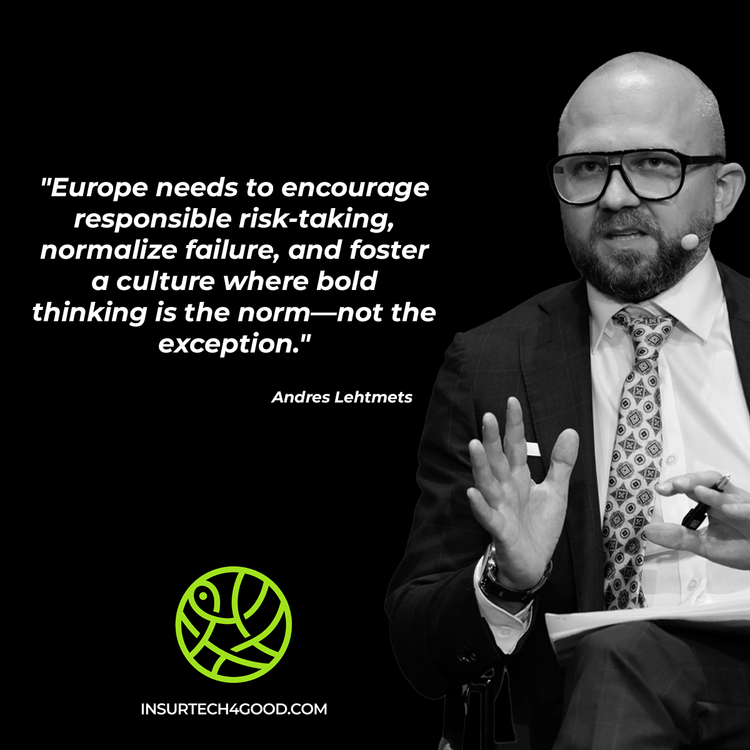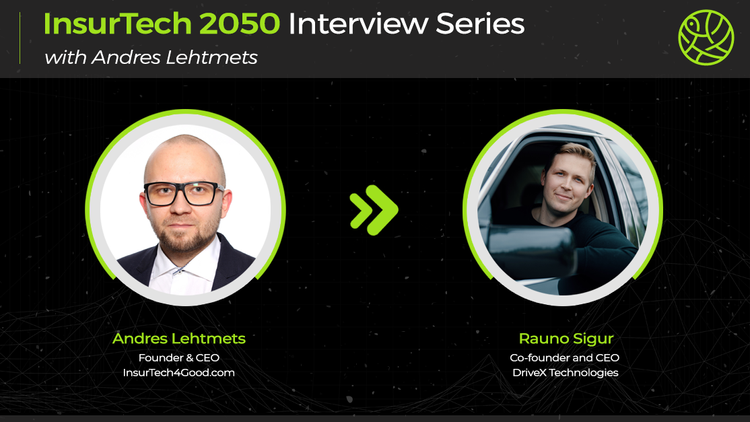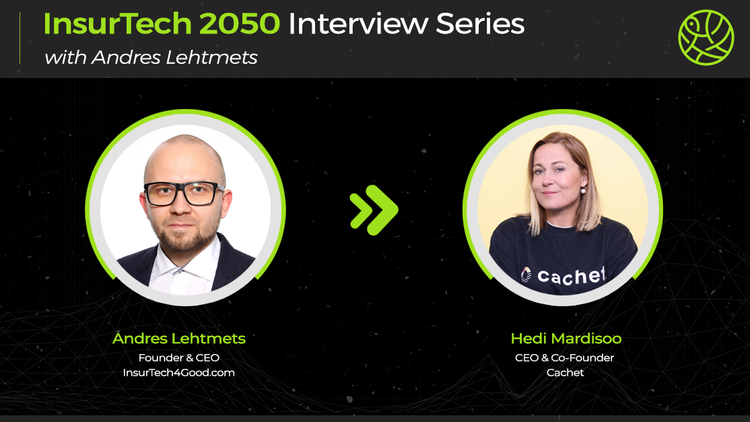InsurTech 2050 | Alain Aun, Rendin

The goal of the InsurTech 2050 Interview Series is to create a platform where InsurTech founders, CEOs, and top insurance regulators and policymakers share their journeys and insights.
This series aims to:
- Inspire and support fellow founders and regulators/policymakers.
- Foster closer collaboration and understanding between these two groups.
- Provide thoughtful, in-depth discussions on the future of insurance and its biggest challenges.
Today I´m speaking with Alain Aun from Rendin.
Thank you for being part of the InsurTech 2050 interview series! Let’s start with your elevator pitch— what is Rendin doing, and what problems are you solving?
Rendin is revolutionizing Europe's long-term home rental market—an industry that's about 25 times larger than Airbnb's current market.
On the consumer-facing side, Rendin is a marketplace that simplifies and streamlines the home rental process, making it much easier and worry-free. Our landlords get 14 times bigger financial coverage on unpaid rent, utilities, and damaged property than traditional security deposits, and tenants can rent deposit-free.
Behind the scenes, our proprietary preventive technologies and active loss-control methods, which we call Solutions Engine, have achieved more than a tenfold reduction in loss ratios within four years. By proactively managing risks, we're not just changing the rental experience—we're setting a new standard for safe and efficient renting.
Tell me about your own journey. Your background is anything but conventional—how did you end up in InsurTech? Many founders are driven by personal pain points. Was that the case for you as well?
I’ve rented homes 14 times in different countries and have also been a landlord myself. At Rendin, we aim to make renting easier and safer for everyone, and insurance is just one of the tools in our toolbox.
Before starting Rendin, I ran a coaching and team-building center, mostly working with smart product and engineering teams from startups. During this time, we ended up doing some innovative projects for an insurance company which made me digg deeper into the industry. Honestly, I've never found traditional insurance particularly exciting and still don’t.
At Rendin, our solution might seem similar to insurance initially, but it's fundamentally different. We've built a completely new approach that challenges traditional definitions and goes far beyond conventional insurance. Insurance at its core is typically passive business model, but Rendin takes a proactive approach. We actively detect and prevent situations that could potentially become claims. Our model leverages behavioral science and continuous nudging to encourage better behavior among all participants in the rental market, ultimately making the market significantly safer for everyone.
In Estonia, Rendin has become quite popular. I’ve personally been a customer since the beginning—an early adopter—and so have my friends and family members who rent out property. What’s the secret behind your success? Is it possible to replicate this in other markets? Or is your success partly due to Estonia’s digital-first approach, trust in digital services, and strong digital infrastructure?
In Estonia, Rendin has established itself as the number one choice for private landlords, already capturing over 15% of the monthly rental agreement market share and outperforming all traditional real estate portals. With 90% of tenants actively seeking a new home subscribing to our platform, we are becoming the dominant force in the rental ecosystem. Currently 10% of all long-term home rental apartments in Estonia have active agreements on our platform and growing.
There’s no secret behind our success—just a great product built on a deep understanding of the market’s core problems and a determination to solve them. Managing risk and taking responsibility for every tenant on our platform is incredibly complex, and these challenges simply can’t be solved with a traditional insurance model.
A few months ago, the leading legacy real estate portal, in cooperation with a major insurance company, attempted to launch a Rendin copycat. Despite their strong distribution channels and direct access to nearly every landlord in Estonia, the initiative struggled to gain traction and now appears to be discontinued.
I’m absolutely convinced that Rendin has pioneered a model that will become the global standard for how home rental markets operate. And, as we’ve seen in Estonia, this is a "winner takes it all" kind of market.
That said, the opportunity is enormous—even compared to Airbnb. But it’s primarily a B2C market, targeting private landlords who typically own a few rental units. Launching successful B2C products in large markets is expensive, and our market doesn’t scale explosively—most landlords already have active rental agreements and can’t switch to Rendin platform immediately. So, building traction takes time.
The question is whether Rendin can find investors with the vision and patience to support a long-term play in a sector that may not fit the typical VC model—but offers a once-in-a-lifetime opportunity to build a monopoly in a massive global industry.
At some point, there was significant media attention in Estonia, including some public debate between Rendin and real estate brokers. Was this part of an orchestrated campaign—similar to how fintechs like Wise have publicly challenged incumbent banks? Or was it more accidental? How are those relationships today?
You're referring to a marketing campaign we ran a couple of years ago, where we openly highlighted a critical issue: that many real estate agents don’t genuinely prioritize landlord safety. We showed that Rendin offers landlords up to 14 times more financial protection than traditional rental deposits, and thanks to our preventive technology and processes, we prevent most of the bad cases from happening in the first place. For most landlords, this protection comes at no cost—so it really is a no-brainer.
Naturally, this triggered some pushback. There’s a perception among real estate agents that Rendin is a threat to their business, and some have tried to discourage landlords from using our service. Last year alone, Rendin paid out nearly half a million euros to landlords to cover unpaid rent and property damage. Our data shows that Estonian landlords lose about 11 million euros every year to these issues—losses that affect many landlords working with traditional agents. Ethically, this raises serious questions about agents who resist offering landlords better protection.
That said, we do have a number of real estate agents who use the Rendin platform to find tenants and protect their landlord clients—and those relationships are going very well. But overall, many agents still try to maintain the status quo, even when it’s not in the best interest of their clients.
Your business model relies on partnerships with insurance companies. Can you tell me more about this? How difficult was it to convince your first insurance partner? Insurers tend to be quite conservative—what motivated them to collaborate with you? You recently changed your insurance partner as well. Could you elaborate on that? How challenging was the transition?
True, our business model needs insurance partnerships for now, but the truth is—it’s complicated. We use the insurance framework because there are no better alternatives available today. Explaining Rendin to insurance professionals has always been a challenge—it doesn’t fit easily into traditional frameworks. While insurers often speak about innovation and partnership, in practice, short-term thinking and simple greed often prevail, killing both innovation and partnership, which is unfortunate.
We’ve built a strong and predictable risk model, and as our portfolio grows, it becomes even more efficient. Therefore, every insurer we’ve spoken to has shown interest in working with us. Our recent transition to a new partner was not without challenges, but we’re optimistic—they seem genuinely open-minded and ready to work together to serve our clients and support our unique approach.
Many InsurTechs start as brokers or agents to collect data and validate their model. Some then move towards an MGA model to gain more decision-making freedom, and a few eventually become full-stack insurers if they find they can operate more efficiently and avoid dependence on a single insurer. Looking ahead, could this be a path for Rendin as well?
Our situation is a bit different. The core problems of long-term home renting are not one-time accidents; they are ongoing processes. That’s one reason why traditional insurance doesn’t work well in this space—and why our model has been so successful. We are, fundamentally, a process company.
Unlike many startups that start with a single pain point, Rendin owns the entire home rental value chain. We’re involved from the very beginning—matching tenants and landlords, enabling seamless digital contracts, evidence-based property handovers, and guiding the rental relationship. We help prevent and solve legal, behavioral, and communication issues that are part of the rental lifecycle.
We’ve never sold insurance as such. What we offer is the best user experience in the rental market—a one-stop-shop that happens to be the safest way to rent out a home. Because we manage the entire rental process and address risks specific to this space, we’ve always had more freedom to innovate than MGAs typically enjoy.
So yes, we see two possible paths ahead: one is to become an insurer ourselves, and the other is to continue operating as an MGA with a forward-looking partner who shares our vision and can support our pan-European growth.
Your business model relies heavily on data, enabling precise risk assessments. However, some argue this conflicts with the principle of risk pooling (mutualization), potentially leaving certain groups priced out or in your case not able to rent property. How would you respond to these concerns?
It’s true that Rendin is a data company, and our unique position enables us to gather insights that no one else in the market can. But several factors give us the freedom not to follow the same path insurers typically take.
First, as mentioned earlier, we’re operating within long-term rental processes—not single, unforeseen events or accidents. That’s why our success doesn’t rely solely on tenant scoring or classic risk pooling, but on actively guiding and supporting rental relationships over time—often for three years or more. I don’t believe anyone can build a crystal ball that predicts human behavior over such a long period. Life just happens. While many variables are unpredictable, most people can be nudged toward better behavior. And while it’s true that tenant behavior poses risks, what’s often overlooked is how landlord behavior can multiply those risks and make resolution far more complex. Long-term home renting across Europe is heavily—and often poorly—regulated. It’s easy to get stuck in legal and procedural complications, and hard to get out. We’ve learned the hard way how to streamline those processes from problem to resolution.
Second, people are becoming increasingly mobile—some by choice, others by necessity. At least 20% of our tenants are expats, including digital nomads, war refugees, students, and others. Contrary to the argument that our model might exclude people, we’ve actually made renting easier for many groups that are traditionally discriminated against—foreigners, families with children, and pet owners. Our landlords trust that if Rendin makes a mistake and there’s a problem, they’re not left alone. We help solve those issues, and if there’s a financial loss the tenant is legally responsible for but fails to cover, Rendin steps in.
Traditional insurers need data from hundreds or thousands of claims to build a reliable model. In contrast, when Rendin enters a new market, we need far less data—often hundreds of times less—to localize our solution engine and start delivering great results.
We can’t have a conversation in 2025 without touching on AI. How much is AI integrated into your business model? What is your AI strategy, and how involved are you in this as a CEO?
Until now, we’ve been deliberately avoiding framing Rendin as an AI company—despite the pressure from some investors to present a magical AI black box that solves everything. That said, we’ve been quietly using AI to address specific challenges in our operations.
There were two main reasons we hadn’t adopted AI on a larger scale before. First, we were a small team with a too small client portfolio and still figuring out how to solve a wide range of complex problems. We needed to understand those problems deeply before applying AI meaningfully. Second, we felt that the capabilities of earlier AI models weren’t strong enough to deal with the kind of legal and behavioral complexity we’re tackling.
But the recent breakthroughs in reasoning models have completely changed the game. We now see enormous potential for AI in our domain, and we’re ready to become part of this revolution. I’m not a technical founder, but I’m nerdy enough to understand what Andrej Karpathy is talking about—and enthusiastic enough to share it with anyone who’s willing (or not) to listen.
From your experience, what are the biggest barriers holding back innovation in insurance? I’m interested in both regulatory barriers, for example what has your experience with insurance regulation been like? Are your challenges primarily at the domestic or EU level? And beyond regulation, what other obstacles do you see?
From my experience, the biggest barriers to innovation in insurance don’t come from regulations—they come from the minds and hearts of insurance professionals. There is little real incentive for them to change anything. Business as usual works well enough. Industries like insurance, real estate, medicine, and law are often magnets for conservative people who build their careers on the assumption that the world won’t change too much.
In my opinion, many startup accelerators that match early-stage startups with corporates are places where ideas go to die. The whole idea that a startup—founded by people who believe they’ve found a world-changing idea—should then join a program to solve some vague problem defined by a corporate team is completely wrong. It kills the soul of innovation before it can even begin.
What the European insurance industry really needs for rapid change is a pan-European open insurance framework—one that brings radically better transparency and flexibility. Switching insurance providers should be as easy as changing mobile operators. Right now, yearly lock-in periods and different regulations allow many insurers—and the banks that own them—to profit too easily at the expense of customers. Opening up the insurance market would truly accelerate innovation and support the development of new business models that better serve consumers.
Do you think regulatory frameworks are keeping pace with InsurTech innovation? If not, what specific changes would you recommend? And from another perspective—how do you stay updated on evolving regulations?
Simply put—no, they are not. But I wouldn’t position myself as someone deeply familiar with the topic to offer detailed recommendations. Aside from the obvious need for greater transparency and flexibility.
That said, we had a rather bizarre experience recently that illustrates the situation. We spoke to several insurers over a short period, and multiple regulatory topics came up. Each insurer had a strong opinion on what the regulations allow or don’t allow—and every one of those opinions was completely different. There was barely any overlap. Yet each was absolutely convinced that their interpretation was the correct and legally compliant one. That alone shows how unclear, fragmented, and outdated the regulatory environment has become.
Let’s look ahead. How do you see the real estate sector evolving by 2050? In mobility, we’re seeing a shift from product ownership to service models. Do you think we’ll see a similar transformation in real estate? How might generational changes influence this?
Looking ahead to 2050, it's difficult to predict exactly how the real estate sector will evolve—but one thing seems clear: we’re entering a turbulent period. Right now, we appear to be caught in a wave of anti-globalism and rising national isolationism. I truly hope this phase ends soon and that we move toward greater global unity to address the challenges we all face together.
Climate change is likely to have a significant, if unpredictable, impact on the European housing market. There is a very real possibility that millions of people—both within and outside of Europe—will need to relocate. If that happens rapidly, there may not be enough time or resources to build new housing, which could multiply today’s housing crisis many times over.
What makes this even more troubling is the fact that Europe already has millions of empty apartments. Many of these remain unrented not because of lack of demand, but because landlords perceive renting as too risky. They prefer to leave properties empty and benefit from long-term real estate value growth instead. This is exactly one of the problems Rendin is trying to solve—by making renting safer and more attractive for landlords.
Generational change will also influence this evolution. Younger generations are more comfortable with service-based models and more open to flexibility. I believe we’ll see a strong shift toward rental living, especially if the market becomes more secure and streamlined. That’s why the role of platforms like Rendin will only grow—we’re building infrastructure for the next generation of renters and landlords.
More broadly, what will insurance look like in 2050? How will technology, customer expectations, and regulations evolve? What trends or emerging technologies do you believe will define the future of insurance?
As for the future of insurance by 2050—I honestly believe that people won’t buy “insurance” as a standalone product anymore. Risk management will be seamlessly embedded into everyday services, much like how Rendin operates today. No customer wants to compare policies or read through fine print to understand coverage. They want peace of mind and a service that simply works.
AI and increased transparency will redefine insurance. The industry will move away from the traditional premium-coverage model and toward a new standard: "we’ll make sure nothing bad happens—and if it does, we’ll take care of it for you." This shift will create room for entirely new business models that put the customer experience at the center. And frankly, that’s how it should be.
Given this vision, how can regulators balance consumer protection with fostering long-term innovation? And what are the practical steps that should be taken today?
Regulators must move away from rigid frameworks built for outdated business models and instead support principles-based regulation that can evolve with innovation. To strike the right balance, regulators should focus on outcomes—ensuring consumers are protected and treated fairly—rather than on prescribing specific rules for how companies must operate.
Practical steps today include establishing regulatory sandboxes to encourage experimentation, increasing dialogue with startups and innovators, and building cross-border frameworks that reduce fragmentation within the EU. Currently, innovative companies like Rendin don’t feel that regulators would be our friends, interested in helping us succeed and making efforts to support us.
One of my goals with this interview series is to provide actionable insights for other founders. What is the most important lesson you’ve learned as an InsurTech founder? What’s one mistake you’ve made that others can learn from? And finally, if you could give one piece of advice to someone starting or considering an InsurTech company, what would it be?
As you can see, this question is actually three questions in one—and each would deserve a thoughtful, detailed answer. But if there’s one thing I’ve learned the hard way as a founder, it’s this: you can’t say yes to everything. There’s always too much to do, and prioritization is essential.
So, in the spirit of practicing what I preach, I’ll skip this multi-part question without worrying that it makes me seem rude. And that, in itself, is a piece of advice I’d offer to anyone starting an InsurTech company.
Now, a few personal questions. How do you maintain work-life balance and ensure your mental well-being as a founder?
I honestly don’t think I could have built Rendin or survived the ups and downs of startup life without my wife's strong support. That’s been absolutely essential.
I don’t think I’ve been very good at maintaining a healthy work-life balance. It’s something I’ve only recently started to reflect on more seriously. What has helped me manage, though, are a few practical habits: cycling—both as a means of commuting and for leisure—and playing badminton. One thing I’ve consistently neglected is taking vacations. I’ve never really prioritized them as an adult, and in retrospect, that feels like a mistake. It’s something I’m planning to fix moving forward.
Do you have any productivity tips—whether it’s a tool, app, or daily habit?
As for productivity tips—this one is only valid if you’re a morning person: wake up early. Mornings are by far the most productive time of day for me. Another thing that’s worked for me is staying away from unnecessary social events. I try to protect my time and energy for the things that matter more than small talk.
What’s one book, podcast, or resource that has inspired or helped you recently?
Check in Youtube Andrej Karpathy’s deep dive in LLMs! I felt it was life changing for me.
To wrap up, please share one concrete ask for the audience. Whether you’re looking for a new CTO, raising an investment round, or engaging with regulators—this is your opportunity to make your request.
Only two humble asks:
- Contact me if you are an investor who'd be ready to join in an expensive, hard, and long journey of taking over the entire home rental market.
- Contact me if you are an insurer who can support and partner with us in our pan-European expansion.
Thank you!





Member discussion